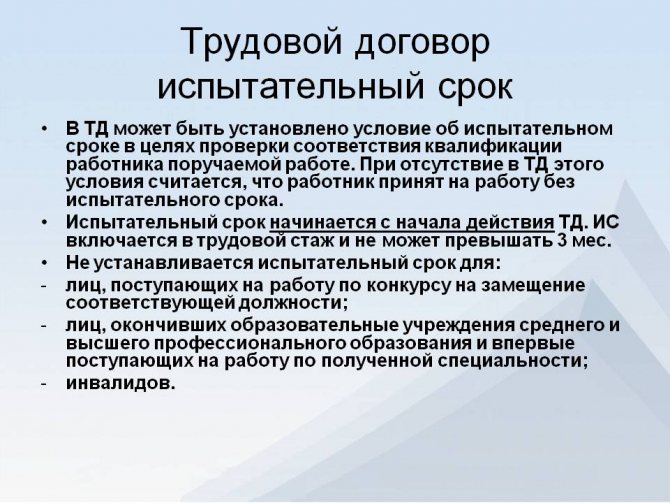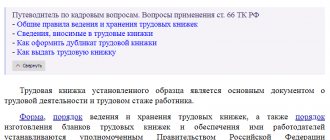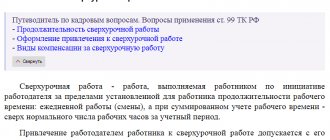Time frame for professional testing
The legislation (in particular, the Labor Code) clearly defines in which cases an entrepreneur can enter into a temporary employment contract with employees.
But despite this, managers ignore regulatory requirements and try to unlawfully induce a potential employee to work on a temporary basis. By law, a fixed-term contract is concluded only in the following cases:
- performing a task on a one-time basis;
- replacing an employee who is temporarily absent due to extenuating circumstances (for example, an employee on maternity leave or an employee undergoing a long internship);
- the vacancy is temporary or seasonal;
- the company briefly increases the scale of work, which in the first stages entails a temporary shortage of personnel;
- the enterprise hires an employee to prevent or eliminate emergency situations;
- internship or practical training after training;
- other circumstances provided for by labor legislation.
Current legislation gives the right to enter into fixed-term contracts for small enterprises with a total staff number of employees not exceeding 35 people. For retail enterprises, this bar is lower and amounts to 20 people.
In order for a fixed-term employment contract to have legal force, formal partnership relations must be formalized. The fact of their existence is considered to be the presence of signatures of the employer and the hired employee on the agreement.
According to accepted standards, the longest duration of a fixed-term contract does not exceed 5 years. The fact of its completion can be the completion of the time specified in it, as well as the occurrence of specified facts (completion of work, exit of a permanent employee, etc.). Signing a fixed-term employment contract does not cancel the probationary period. Even if a new employee works at the enterprise temporarily, the manager has the right to verify his level of preparedness.
In some situations, company management is forced to resort to the services of specialists for a certain period of time. In this case, a fixed-term employment contract is practiced. Since labor inspection is relevant in these cases, management is required to take into account many formalities in order to avoid claims.
A fixed-term contract is signed for a strictly defined period due to the temporary absence of a permanent employee approved in the position for which the person is applying. For example, a temporary employment contract is concluded to perform a set of professional duties for an absent employee who is on maternity leave.
In addition, a temporary contract is relevant for:
- Seasonal work. Due to climatic circumstances, the work will last for two or several months.
- Work outside the Russian Federation. In this case, the temporary contract is signed for 3 years. If the set of professional responsibilities expands or continues in a given position, the contract is renegotiated.
- For overtime work that is not part of the traditional professional specifics of the company. These include: reconstruction or restoration work - in case of urgent liquidation of the results of an emergency situation at production; repair - if it is necessary to carry out repairs in the office or some other objects on the company’s balance sheet.
Establishing a probationary period for a fixed-term contract is the right and obligation of an employer interested in the impeccable quality of performance of the entire range of work in an enterprise or institution under its jurisdiction.
It is important that domestic legislation does not regulate the scope of the smallest test. However, a conscientious employer is guided by the obligation to notify 3 days in advance (no less!) about the dismissal of a newcomer who has not demonstrated the proper professional qualities (Article 71/Part 1). Accordingly, the most concise test period should be at least 4 days.
The longest period of temporary employment for a temporary worker is limited to five years. This provision is stipulated in the Labor Code (Article 58/Part 1).
In addition, the probationary period is determined by the following circumstances:
- The specifics of the enterprise's activities. Depending on the nature of the production - from 2 months to six months (Article 70/Part 6). Accordingly, the test period under such conditions is imposed for no more than 2 weeks.
- A probationary period for a fixed-term employment contract of 3 months is established if the temporary contract is concluded for 6 months.
Of course, the law regulates a much larger number of situations that can legally be interpreted as grounds for concluding a fixed-term contract and ordering a trial.
We invite you to familiarize yourself with: Agreement for the storage of building materials and their sale at the order of the bailor (mixed agreement of storage and commission) (approximate form)
For example, the manager and his deputies are excluded from this regulation.
In addition, the exclusion rules apply to:
- heads of branches (however, deputies are not taken into account in this case);
- chief accountant/deputy chief accountant;
- heads of autonomous parts of the company.
When entering any position in the civil service, the longest probationary period is 12 months.
Is it possible to assign a probationary period for a fixed-term employment contract?
Art. 70 and 71 of the Labor Code of the Russian Federation confirm the legality of the appointment of a verification period for new workers. For a manager, this is an opportunity to evaluate the abilities and professional qualities of a subordinate. In case of improper performance of your duties, you can terminate the contract without completing the required period and severance pay.
For the employee, this is a chance to understand whether this is really the company and field of activity to which he would like to devote himself.
If a person gets a job temporarily, for such cases the Labor Code stipulates the execution of a fixed-term contract. This document is drawn up under the following conditions:
- the work is temporary and takes up to several months to complete (seasonal);
- only specifically specified tasks are implemented;
- employees work outside the state;
- a place is reserved for the absent person for whose position the candidate is hired (the period of parental leave);
- expansion of the enterprise occurs for a short period of time;
- internship.
ATTENTION! A probationary period for a fixed-term contract is appointed with the consent of both parties.
An employer has the right to enter into a non-permanent work agreement:
- with elderly people or people with disabilities (due to health reasons);
- with part-time workers and students;
- in case of receiving a pension by employees of the federal service;
- when the company has up to 35 employees.
A temporary employment contract is concluded for a certain period; all interested parties must be familiar with its terms.
Possible results of the test
Upon successful completion of the probationary period, the newcomer will continue to perform his work functions within the time specified in the contract. In such cases, an entry of the established form is made in the newcomer’s personal book, the basis of which is the management’s order for admission to the position. No explanation is required regarding the temporary nature of the working relationship. If the results of the check are unsuccessful, the employer has the right to terminate the employment contract unilaterally. This possibility is spelled out in Part 1 of Article 71 of the labor legislation. The law provides a similar opportunity to a subordinate; he can also refuse a vacant position. But unlike the employer, he is not obliged to explain the reason for such a decision. In both cases, a written notice of termination of cooperation is sent 3 working days in advance.
The employer's document must necessarily include information about which components of the test were not taken into account. It is written in two copies, the first duplicate remains in the organization. The second copy is issued to the employee against signature. If a notification is refused, a report on the incident is written. After this, a dismissal order is issued, related documents are drawn up, and the failed employee is paid for the time worked in the company. He is not entitled to any additional severance pay.
If the dismissed subordinate does not agree with the reasons why the inspection was considered unsuccessful, then he can challenge the unfair decision in his opinion to higher authorities.
The law will be on the side of the employer if the following conditions are met:
- the temporary contract was signed before the employee began performing his official duties;
- the procedure and timing for scheduling an inspection comply with legal norms;
- The employee was laid off at the time of passing the test.
In case of non-compliance with regulatory requirements, as well as the employer’s inability to justify the reasons for dismissal, the employee will be reinstated in his position through the courts.
In the absence of mutual desire to terminate cooperation, a fixed-term employment contract can easily be converted into an open-ended one. This happens automatically three days before the end of the period specified in the documents signed at the admission stage.
Is it installed?
The Labor Code of the Russian Federation (LC RF) does not oblige employers to establish a probationary period for new employees, but does not deprive them of this right. When selecting an employee for a certain position, every manager wants to get a qualified employee, and a fifteen-minute interview, of course, will not provide an opportunity to verify the candidate’s competence. Therefore, when hiring, even under the terms of a fixed-term contract, employers prefer to assign a probationary period to newly hired employees.
According to Art. 70 of the Labor Code of the Russian Federation, before assigning a test to a candidate, the employer must discuss this point with him; if the candidate agrees, this clause is included in the employment contract, and the employee confirms his consent with a personal signature.
From a legal point of view, the parties must agree on a voluntary basis to establish a trial period.
A fixed-term employment agreement is concluded for a specific period of time. One of the points in the document indicates the time period during which the employee undertakes obligations to perform established job functions. The probationary period depends on the validity period of the employment contract and should not contradict the law (Article 70 of the Labor Code of the Russian Federation).
Categories of citizens to whom it cannot be assigned
Article 70 of the Labor Code of the Russian Federation establishes a number of restrictions, taking into account which not all candidates for a position must pass tests.
So, the following are exempt from it:
- persons applying for an open vacancy based on the results of a competition held on the basis of labor legislation;
- minor citizens;
- women during pregnancy, as well as mothers with children under 1.5 years old;
- persons who have graduated from an educational institution and are employed for the first time within one year from the date of graduation;
- elected to elective office;
- if an employee is transferred from another place of work based on a decision made between the heads of two enterprises;
- persons who are employed for a period of up to 2 months;
And also in other cases specified in the Labor Code of the Russian Federation, other regulations or in the collective labor agreement.
In what cases is the test not necessary?
Candidates cannot be assigned a probationary period in the following situations:
- if a person, by his own consent or by appointment of a manager, begins to perform work for a specified period;
- if, when signing the employment agreement, the document did not include a clause regarding the probationary period of a particular employee;
- if the employment relationship between the parties is formalized for a period of up to 2 months.
Probation period: the fundamental importance of proper documentation
So, it is known that upon taking up a position an employment contract is concluded. It clearly states all the conditions of the professional test that the management offers. Otherwise, supervisors will consider that the employee was not subject to the test.
If a new employee is allowed to work when the contract has not yet been signed, then the very fact of imposing the test must somehow be documented as a separate document. This will provide grounds for transferring it into the main employment contract in the future.
If this condition is not met (recorded in a separate document), then supervisory authorities may consider during the inspection that the employee took up his position without the imposed test.
The ideal option for this is to draw up an annex that accompanies a classic employment contract. It is recommended that the application detail all of the subject's professional responsibilities. At the same time, in the main text of the temporary contract it is necessary to emphasize that the condition for recognition of the fact of passing the test will be the conscientious performance of the functionality assigned to the employee.
If suddenly, during the test imposed on him, an employee did not demonstrate the required level of professionalism or showed signs of dishonesty, it is advisable to document each such fact. Subsequently, this will provide the employer with a basis for making a final decision.
In order for a fixed-term contract to acquire the status of a permanent one, the newcomer must clearly perform all professional functions during the trial. Deviations from this requirement are recorded by memos, reports or acts.
When can a probationary period not be established?
In relation to fixed-term employment contracts, it is expressly prohibited to set a trial period if the duration of the employment relationship is initially planned to be no more than two months. This duration is typical for employment contracts concluded for seasonal work or to replace an absent employee, if the period of absence is expected to be of this duration. In addition, in relation to fixed-term contracts, the law prohibits establishing a probationary period in the following cases:
- For employees who underwent training at the expense of the employer - when applying for permanent employment upon expiration of the apprenticeship contract.
- For civil servants who either received professional education at the expense of the relevant government body, or enter service by transfer from a layoff body.
- For pregnant women or women whose youngest child is under one year and six months old.
- For minors under eighteen years of age applying for work (an employment contract in Russia can be concluded at sixteen, and in some cases even younger).
- For those who in Soviet times were called young specialists - people who graduated from a university or vocational school less than a year ago.
- For persons entering into an employment contract as a result of a transfer by agreement of two employers.
This list is incomplete. The law or a collective agreement concluded between the employer and employees of a particular enterprise allows the establishment of additional restrictions.
In what cases is the test not established?
Labor legislation aims to protect certain categories of citizens holding temporary positions. According to Article 70 / Part 4, tests are not imposed on pregnant women. In addition, employees who have dependent children under three years of age are also exempt from probation under a fixed-term contract.
We invite you to read: Who is eligible for additional emergency leave?
Other categories of employees not subject to testing include:
- young specialists after universities, technical schools and colleges;
- minor workers;
- employees holding a position based on a special letter from a friendly or partner organization;
- specialists who took office for no more than 2 months;
- employees in elected positions (their work is paid).
Employees who win a professional competition are also not subject to the test.
The probationary period for a fixed-term employment contract cannot exceed 3 months. But there are some employees for whom it is possible to set this period for 6 months. These include the following specialists:
- chief accountant of the enterprise;
- heads of various departments of the company;
- a specialist acting as deputy director or chief accountant;
- heads of branches or divisions of the company.
For people who plan to work as government employees, the probationary period can be set to up to one year.
Article 70 of the Labor Code of the Russian Federation. Employment test (current version)
1. The purpose of the hiring test is to check the employee’s suitability for the work assigned to him. The probationary agreement is one of the additional terms of the employment contract. Therefore, it must be indicated in the employment contract itself, if the parties have agreed on such a condition. It is the employment contract that is the basis for indicating in the employment order that the employee has been hired on a probationary period. If the test condition was not agreed upon when concluding the employment contract and is not provided for in it, it is considered that the employee was hired without a test. The employer does not have the right to set a probationary period for the employee by order of hiring, if the employment contract does not provide for a probationary period.
An exception to this general rule is in cases where an employee is actually allowed to work without drawing up an employment contract. In this case, when the employment contract is subsequently drawn up in writing, a condition on a probationary period may be included in it. However, the following conditions must be met: the parties agreed before starting work that the employee is hired on a probationary period; this arrangement is formalized by a separate agreement (i.e. in writing). Thus, this exception does not affect the general principle of establishing a probationary period for an employee, i.e. by agreement of the parties.
2. During the probationary period, the employee is fully subject to the provisions of legislation and other regulatory legal acts containing labor law norms, agreements and a collective agreement, if adopted by the organization. During this period, the employee is obliged to obey the internal labor regulations and has the right to payment of wages in full, to temporary disability benefits, etc.
In turn, the employer has the right to demand from the employee the fulfillment of all obligations stipulated by the employment contract, as well as, on his own initiative, to terminate the employment contract with the employee during the probationary period on any basis provided for by the Labor Code in compliance with all established conditions.
Thus, if an employee hired on a probationary period is subject to dismissal from work before the expiration of the probationary period due to a reduction in the number or staff of employees, the dismissal must be carried out in compliance with all the conditions provided for employees dismissed on this basis (see commentary to Art. 81, 178, 180).
3. Part 4 art. 70 defines the category of persons for whom a test for employment cannot be established. These include:
- persons elected through a competition to fill the relevant position, conducted in the manner established by labor legislation and other regulatory legal acts containing labor law norms;
- pregnant women and women with children under the age of one and a half years;
- persons under 18 years of age;
- persons who have received secondary vocational education or higher education in state-accredited educational programs and are entering work for the first time in the acquired specialty within one year from the date of receiving vocational education at the appropriate level;
- persons elected to an elective position for paid work;
- persons invited to work by way of transfer from another employer as agreed between employers;
- persons entering into an employment contract for a period of up to two months.
This list is not exhaustive. The Labor Code, federal laws and collective agreements may establish other cases when a probationary period is not established when hiring.
If the condition of probation was provided for a person who, in accordance with Part 4 of Art. 70, a test for employment cannot be established; it cannot be applied, even if the person does not object to such a condition.
This rule is based on the provisions of Art. 9 of the Labor Code, according to which collective agreements, agreements, employment contracts cannot contain conditions that limit the rights or reduce the level of guarantees of workers in comparison with those established by labor legislation and other regulatory legal acts containing labor law norms. If such conditions are included in a collective agreement, agreement or employment contract, then they are not subject to application.
4. Part 5 Art. 70 establishes deadlines for testing when hiring. As a general rule, it cannot exceed three months. A probationary period of longer duration, but not more than six months, may be established for the head of the organization, his deputies, the chief accountant and his deputies, the head of a branch, representative office or other separate structural unit. A different probationary period for employment for these workers may be established by federal law.
As can be seen from the content of this norm, the circle of persons who can be subject to a probationary period for employment lasting more than three (up to six) months is limited. In this regard, a probationary period of up to six months cannot be established, for example, for the deputy head of a branch, representative office or other separate structural unit, its chief accountant, as well as the head of a workshop, department, sector and other similar structural units of the organization, regardless of the degree their isolation.
The Labor Code and other federal laws may establish others, incl. minimum or maximum test periods. Thus, according to Part 6 of the commented article, when concluding an employment contract for a period of two to six months, the trial period cannot exceed two weeks. Within the established deadlines, the parties to the employment contract themselves determine its specific duration.
5. The probationary period begins to run from the first day of work. In accordance with Part 7 of Art. 70, the probationary period does not include all periods when the employee was actually absent from work. These may be periods of temporary disability, being on short-term leave without pay or on leave in connection with training, performing state or public duties, etc. After the break, the probationary period continues. The total duration of the probationary period before and after the break should not exceed the period stipulated in the employment contract.
Within the meaning of the commented article, the probationary period should not include any periods when the employee was actually absent from work, incl. and without good reason (for example, a period of absenteeism).
At the same time, it should be borne in mind that for violation of labor discipline during the probationary period, disciplinary measures provided for by the Labor Code may be applied to the employee, incl. dismissal (see commentary to Article 81).
Comment source:
Rep. ed. Yu.P. Orlovsky “COMMENTARY ON THE LABOR CODE OF THE RUSSIAN FEDERATION”, 6th edition ACTUALIZATION
ORLOVSKY Y.P., CHIKANOVA L.A., NURTDINOVA A.F., KORSHUNOVA T.YU., SEREGINA L.V., GAVRILINA A.K., BOCHARNIKOVA M.A., VINOGRADOVA Z.D., 2014
What legal norms govern
The introduction of a probationary period within the framework of an employment contract is regulated by the norms of the Labor Code, and may also be based on local regulations adopted by the employing company.
Lawyer's opinion
Dmitry Ivanov
Legal Support Center
This article talks about typical ways to resolve the issue, but each case is unique. If you want to find out how to solve your particular problem, call:
Or on the website. It's fast and free!

In the Labor Code, the probationary period is regulated by Art. 70.
However, the procedure for passing the test is not regulated by law. An employee is assessed for suitability for his position by the employer at his own discretion.
The results of passing or failing the probationary period should be documented in the form of a written report. It should be accompanied by management reports, testimonies of other employees, customer reviews and other documents.
Although there is no legal requirement for written documentation of test results, if it is necessary to dismiss an employee in the future, such a document will serve as proof that the employer is right.
In addition to the Labor Code, explanations regarding the procedure for applying the probationary period are contained in paragraph 9 of the resolution of the Plenum of the Armed Forces of the Russian Federation on the application of labor law norms and in letters of recommendation.
Test duration
In general, there are no uniform requirements regarding how long the shortest test period will last.
The duration of the probationary period for a fixed-term employment agreement depends on the characteristics of production, working conditions and on the period for which the contract was drawn up (Article 70, Part 6 of the Labor Code). Universal requirements:
- for a contract period of 2 – 6 months, no more than 14 days of testing;
- up to 3 months of probation are required in cases where the duration of work duties exceeds six months;
- persons applying for a management position in the company, as well as accounting employees, will have to work for six months under a probationary period;
- one year is the verification period for civil servants (this is the maximum permissible period).
Weekends and holidays are not excluded from the trial period.
It is strictly prohibited to assign a probationary period to employees hired to perform labor duties temporarily, with a contract duration of up to two months. Violation of current conditions may result in administrative liability.
Concept
A probationary period is a period set by the employer in order to test his professional suitability.
Current legislation indicates that the probationary period is assigned taking into account the following rules:
- The presence of mutual agreement of the parties on the inclusion of a probationary period in the employment contract.
- The probationary period condition can only be used in relation to new employees hired (not those who came to the company as a result of a transfer).
- The probation period must be specified in the employment contract, which is signed by both parties. If this document does not contain a condition on the existence of a trial, then the employee is considered hired without a probationary period.
According to Art. 67 of the Labor Code, if an employee begins his work duties without a written contract, then an agreement on the conditions of the probationary period is signed with him even before the start of activity. It is unacceptable to include this clause in an employment contract after the fact.
It is also worth considering that an employee on a probationary period has the same rights as all other employees and cannot be discriminated against. In particular, on the basis of Art. 22 of the Labor Code, an employee has the right to equal pay for performing a similar job function. This means that during the probationary period the employee is not allowed to reduce his earnings.
In addition, the test condition is prescribed in the work order under Art. 68 Labor Code. At the same time, the employment note in the employee’s work book does not contain any additional information about his employment for a probationary period. This corresponds to the Instructions for filling out work books dated 2003 No. 69.
Test and fixed-term contract
The general rule is that the test under a fixed-term contract is applied if its validity period is more than two months. It is used in relations between an employee and an employer only by agreement of the parties (Parts 1 - 3 of Article 70 of the Labor Code):
- if the agreement does not contain this condition, the employee is accepted without this condition;
- if an employee is allowed to perform duties without registration (Part 2 of Article 67 of the Labor Code), the probationary condition is included in the TD only by a separate agreement.
- The employee is subject to labor regulations, provisions of the collective agreement, local agreements and acts.
Duration
According to current legislation, the maximum duration of the probationary period cannot exceed 3 months. In this case, the employer determines the actual duration of the test based on his preferences, but within the established limit. The employer does not have the right to establish a longer probationary period than three months in internal documentation.
But for certain categories of employees it is possible to establish a longer probationary period than 3 months. Thus, for some employees it is possible to introduce a trial period of up to six months. We are talking about the head of the organization (or his deputy), the chief accountant (or his deputy), the head of a separate division (branch or representative office), etc.
We invite you to read: Time off for work on a holiday according to the Labor Code of the Russian Federation: payment or day off, how to arrange it?
For persons who enter into an employment contract for a period of 2 months (fixed-term employment contract), a maximum probationary period of 2 weeks is established (according to Article 70 of the Labor Code).
The law does not establish a lower limit for the duration of the probationary period. It can be anything, regardless of the type of contract concluded: fixed-term or unlimited.
Exceptions regarding the length of the term are established for civil servants. The rules on the issue of testing for these persons are contained in the Federal Law “On the State Civil Service of the Russian Federation” dated 2004 No. 79-FZ. It is indicated here that the duration of the test can be 1 month-1 year.
How to document a probationary period
Before the start of the working period, all the nuances of cooperation are discussed and included in the fixed-term contract. If an employment agreement has not been concluded, and the person needs to begin performing his duties, then the temporary documents must indicate the presence and duration of the probationary period. When concluding the contract, this fact will be noted in it. Otherwise (according to Article 70 of the Labor Code of the Russian Federation), it is considered that the trial time was not established.
The agreement must indicate the start and end date of the validity, otherwise it will be considered unlimited. It includes important nuances:
- Maximum test period.
- The reason why the duration was assigned.
If there are inaccuracies in the contract, then if controversial issues arise (for example, when dismissing an employee) and contacting the labor inspectorate, it will be difficult for the applicant to prove his case. It is advisable to keep copies of signed documents.
Extension of deadline
The increase in the length of the probationary period can be explained by the fact that the employee cannot always demonstrate his skills and abilities in the allotted time. However, at this time, the employee’s salary is lower than that of persons in the same position who work full-time.
IMPORTANT! Extension of the probationary period is not permitted by law.
Days not worked for a good reason are excluded from the employee’s verification period (Article 70 of the Labor Code of the Russian Federation).
Extension
The employer does not have the right to extend the duration of the probationary period beyond the period prescribed by law. Even if the employee agrees to extend the trial, it will be illegal.
Extension of the probationary period is allowed in the event of an employee’s temporary incapacity for work or when he is not at work for other reasons (for example, if he was on leave without pay or served as a jury).
Under the above circumstances, the probationary period is considered interrupted and resumes after the subject returns to work. As a result, the end date of the probationary period, which was specified in the employment contract, is shifted.
In this case, the total time for completing the probationary period, which consists of the time before and after the break, is added up and should not exceed the time limits established by law or by agreement of the parties.
What does it represent?
A probationary period is introduced in accordance with Article 70 of the Labor Code of the Russian Federation and is used to test the qualifications and work skills of an employee in the presence of duties and conditions that are further considered permanent. Moreover, this period of time is not required.
A probationary period is a period of time agreed upon in advance by the employer and the individual being hired.
The size of the specified period largely depends on the position of interest to the applicant. This agreement is not mandatory, but the condition of this period is always specified in the employment contract.
For example, the parties came to a mutual agreement, in accordance with which they determined a specific probationary period. During this time, both sides look closely and evaluate each other. If everything goes well, the employee remains hired on a general basis.
In the opposite situation, at the initiative of one of the parties, the employee quits.
The peculiarity of the trial period is that it allows for a simplified dismissal procedure for a new employee who has worked in his position for a short period of time.
Here you will find a form of an employment contract with a probationary period.
In accordance with the law, not for every group of applicants employers have the opportunity to stipulate a probationary period in the contract. For whom is it possible? This list includes:
- Persons selected based on competitive programs and filling strictly prescribed vacancies.
- Women with children under one and a half years of age, as well as pregnant women.
- Minor applicants.
- Citizens who have received higher, secondary or primary education in relevant institutions with the obligatory provision of state accreditation, if they get a job in their specialty for the first time. This condition must be met only within a year from the date of completion of the educational process.
- Persons who entered work as a result of transfer from one company to another. This is permissible with the mutual consent of employers on both sides.
- Citizens who have been assigned to paid work for the position presented.
- Persons who have entered into a temporary employment contract with the employer, the duration of which does not exceed 2 months.
Dismissal
According to Art. 71 of the Labor Code, if the results of the probationary period are unsatisfactory, then the employment contract can be terminated in a simplified manner.
In this case, the employer must properly warn the employee about the upcoming dismissal. Such notice must be in writing and given to the employee at least three days before the upcoming termination of the employment contract. In this case, the notification, among other things, states the reasons for unsatisfactory completion of the test.
The notice must be given under the personal signature of the employee. If he refuses to receive this document, then the employer must draw up an act of refusal with the participation of several witnesses. A copy of the notice is sent to the employee's home address at least 3 days before dismissal.
If the notification procedure for terminating an employment contract with a subject is not followed, then the termination of the contract may be considered illegal and require the employee to be canceled and reinstated in the workplace.
In this case, the employer, among other things, will have to compensate the employee for temporary absence.
Minimum and maximum duration
When assigning a probationary period to an employee, it is important that the period complies with legal requirements. The Labor Code does not establish a minimum period during which an employer can check an employee’s professional suitability. But taking into account the fact that upon dismissal an employee must be notified no later than 3 days in advance, it turns out that the minimum probationary period can be 4 days.
When concluding a contract for temporary work from 2-3 to 6 months, the test cannot last more than 2 weeks (Article 70 of the Labor Code of the Russian Federation). In accordance with the law, an employment contract must necessarily contain information about the employee passing the IP (Article 70 of the Labor Code of the Russian Federation).
If a person has begun to perform his duties, but the contract has not yet been signed, then an additional document must be concluded about the beginning of the IP so that in the future the information can be transferred to the employment contract (Article 67 of the Labor Code of the Russian Federation).
If information about the probationary period was not recorded in the documents, then the candidate is automatically accepted for the position without passing the IS.
Do days spent on sick leave count?
During the probationary period, the employee may not go to work due to illness. He must confirm his incapacity for work for a given period of time with a sick leave certificate issued by a medical institution.
The period of absence of an employee associated with his disability is not taken into account during the probationary period (Article 70 of the Labor Code of the Russian Federation).
This also applies to leave without pay, time off, training and other things.
Is it possible to extend?
Information about the employee's passing of the IP is recorded in documents during employment and certified by the signatures of the employee and employer. Subsequent changes to the contract, including extension of the trial period, are considered illegal.
The employer has the right to extend IP only for the duration of the employee’s absence from the workplace due to illness, vacation, time off, or training, for which he has provided documentary evidence. You can find out more about extending a fixed-term employment contract for a new term and for an indefinite period here, and in this article we talked about how to competently extend or terminate such a contract if an employee is pregnant.
If there are legal grounds for prolonging the IP, then the enterprise must draw up a corresponding order, which is supported by documents provided by the employee.
Taking into account the extension and days of absence of the employee from the workplace, the probationary period should not exceed the time limits established by Art. 70 Labor Code of the Russian Federation.







